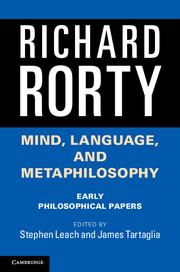Book contents
- Frontmatter
- Contents
- Foreword
- Acknowledgments
- Introduction
- 1 Pragmatism, categories, and language
- 2 The limits of reductionism
- 3 Realism, categories, and the “linguistic turn”
- 4 The subjectivist principle and the linguistic turn
- 5 Empiricism, extensionalism, and reductionism
- 6 Mind-body identity, privacy, and categories
- 7 Do analysts and metaphysicians disagree?
- 8 Incorrigibility as the mark of the mental
- 9 Wittgenstein, privileged access, and incommunicability
- 10 In defense of eliminative materialism
- 11 Cartesian epistemology and changes in ontology
- 12 Strawson’s objectivity argument
- 13 Verificationism and transcendental arguments
- 14 Indeterminacy of translation and of truth
- 15 Dennett on awareness
- 16 Functionalism, machines, and incorrigibility
- Index of names
- References
8 - Incorrigibility as the mark of the mental
Published online by Cambridge University Press: 05 June 2014
- Frontmatter
- Contents
- Foreword
- Acknowledgments
- Introduction
- 1 Pragmatism, categories, and language
- 2 The limits of reductionism
- 3 Realism, categories, and the “linguistic turn”
- 4 The subjectivist principle and the linguistic turn
- 5 Empiricism, extensionalism, and reductionism
- 6 Mind-body identity, privacy, and categories
- 7 Do analysts and metaphysicians disagree?
- 8 Incorrigibility as the mark of the mental
- 9 Wittgenstein, privileged access, and incommunicability
- 10 In defense of eliminative materialism
- 11 Cartesian epistemology and changes in ontology
- 12 Strawson’s objectivity argument
- 13 Verificationism and transcendental arguments
- 14 Indeterminacy of translation and of truth
- 15 Dennett on awareness
- 16 Functionalism, machines, and incorrigibility
- Index of names
- References
Summary
In this chapter I argue, first, that various “topic-neutral” translations of mentalistic statements propounded by materialists are unsatisfactory in that they do not catch the specifically “mentalistic” element in these statements. I then go on to argue that to isolate this element one needs to insist on the incorrigibility of first-person reports of mental states. Finally, I consider whether this insistence is an obstacle to materialism.
We may begin by recalling that the origin of the attempt at “topic-neutral” translations of mentalistic statements was an attempt to avoid what we may call the “irreducible-properties objection” to the thesis that mental states are identical with brain states. This objection says that, even if the identity thesis frees us from nomologically dangling entities, it cannot free us from nomologically dangling properties – viz., those properties by which we originally identified the mental entities as such. Thus, for example, a sensation of yellow has the property “of yellow,” and the thought that p has the property “that p”; but it seems to make no sense for any brain-process to have either sort of property. So these properties seem irreducible. J. J. C. Smart originally tried to get around this objection for the case of sensations by saying that “I am having a sensation of yellow” was equivalent to (or could roughly be paraphrased as) “Something is going on in me like what is going on when I see something yellow.” More recently, D. M. Armstrong has employed the same technique in a program of translating (or paraphrasing) all statements ascribing mental states as statements containing the subject term “a state apt for the production of the following sorts of behaviour.”
Information
- Type
- Chapter
- Information
- Mind, Language, and MetaphilosophyEarly Philosophical Papers, pp. 147 - 171Publisher: Cambridge University PressPrint publication year: 2014
References
Accessibility standard: Unknown
Why this information is here
This section outlines the accessibility features of this content - including support for screen readers, full keyboard navigation and high-contrast display options. This may not be relevant for you.Accessibility Information
- 2
- Cited by
